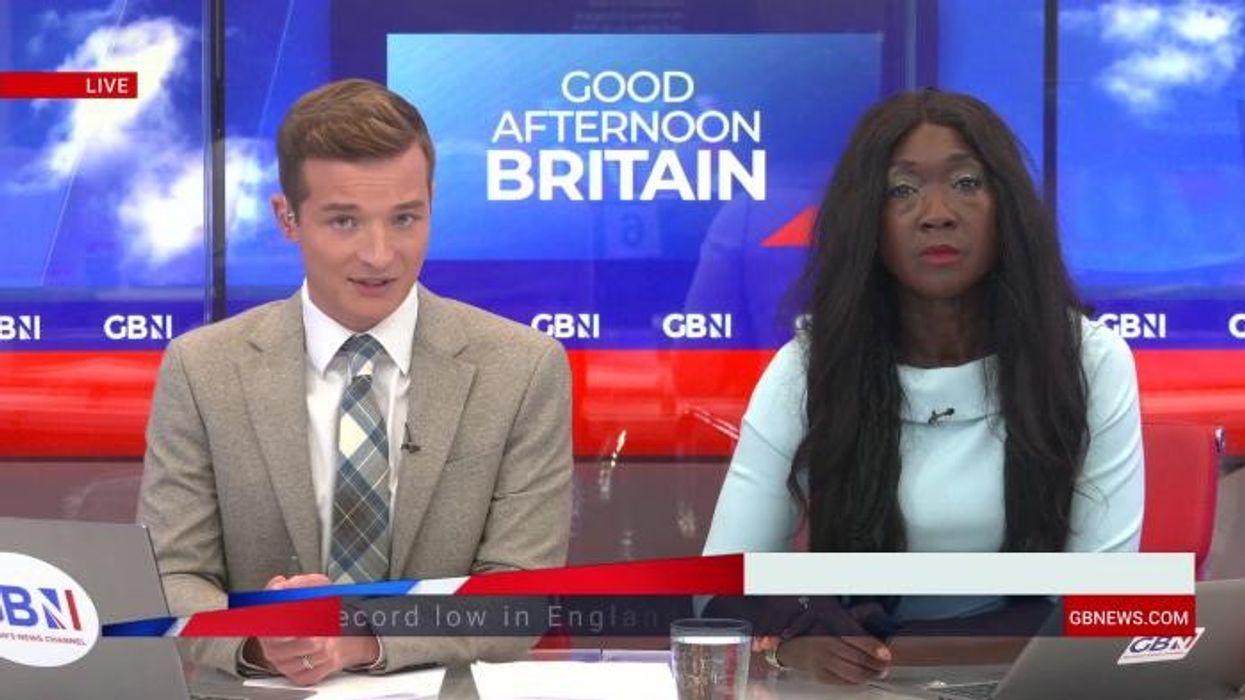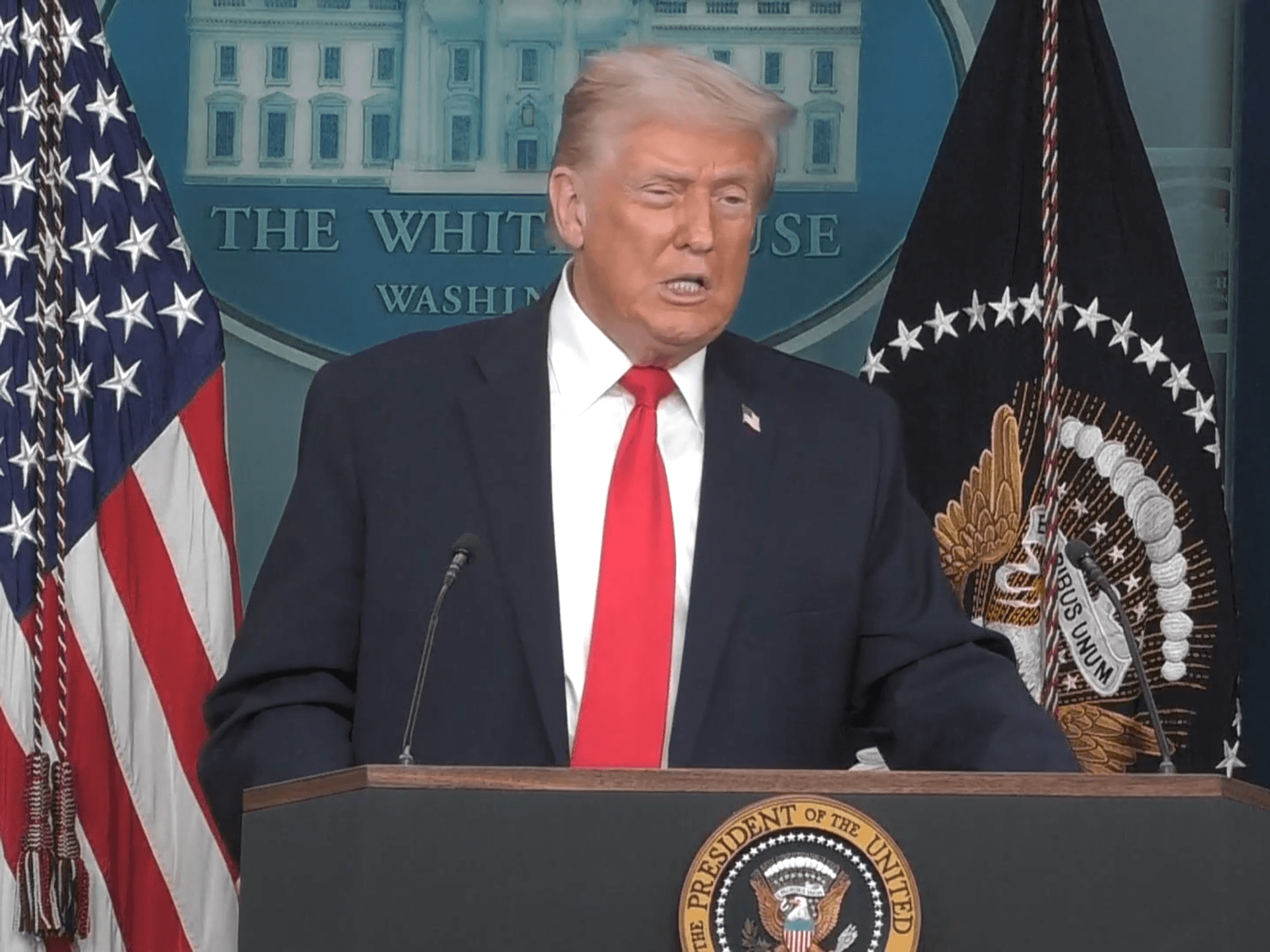REVEALED: The true reason behind Britain's baby bust - and why the UK birth rate is plummeting

Despite a lower percentage of the population having children, the number of births has increased slightly due to population growth, mainly driven by migration
Don't Miss
Most Read
Trending on GB News
Birth rates have collapsed to a new record low in England and Wales for the third year in a row, new data revealed earlier this week.
GB News has explored the reasons behind Britain's baby bust, with experts blaming economic, cultural and political factors for the new low.
In 2024, the total fertility rate was 1.41 children per woman for England and Wales, compared to 1.42 in 2023, new Government data said.
However, the total fertility rate for England and Wales has been in decline for more than a decade, dropping to a record low this year.
The Centre for Social Justice's policy director Edward Davies told GB News: "People are starting to wake up to the fact that a low birth rate will have profound consequences for the UK in the decades ahead.
"A rapidly ageing population will have a deep impact on health and social care budgets, while the state pension will become completely unaffordable in its current form.
"There are many factors that impact birth rates. Historically, these may have been health and/or contraception, while recently, factors such as housing, cost of living and more intangible cultural factors around being 'pro-child' tend to be cited."
Miriam Cates, former Conservative MP and advocate for increasing Britain's birth rates, also argued that the nation's future depends on Britons "having enough children to sustain our society and economy into the future."
She told the People's Channel: "Over recent decades, we have increasingly seen the decision to have children as a ‘personal choice’.
"Of course, in Britain, with universal and freely available access to abortion and contraception, becoming a parent is a free choice.
"But for our nation, assuming we want Britain to survive and prosper, having children is not optional.
"We are stuck in a vicious circle where working-age people have to pay higher and higher taxes to support the growing number of retirees, but this means that they can’t afford to have children, which is the one thing that would prevent the situation from getting any worse."
Despite a lower percentage of the population having children, the number of births has increased slightly due to population growth, mainly driven by migration.
Britain has experienced its greatest population growth in 75 years due to immigration, data compiled by the Office for National Statistics has shown.
Mrs Cates said: "Mass immigration has had significant negative effects on our culture and economy, and represents a huge failure of democracy, given that the British population has voted consistently for lower levels of immigration.
"But one of the main drivers for importing migrants has been chronic low birth rates, which have led to a shortage of young workers in our labour force."
The population of England and Wales has increased by over 700,000 since June 2023, according to the data.
LATEST DEVELOPMENTS:
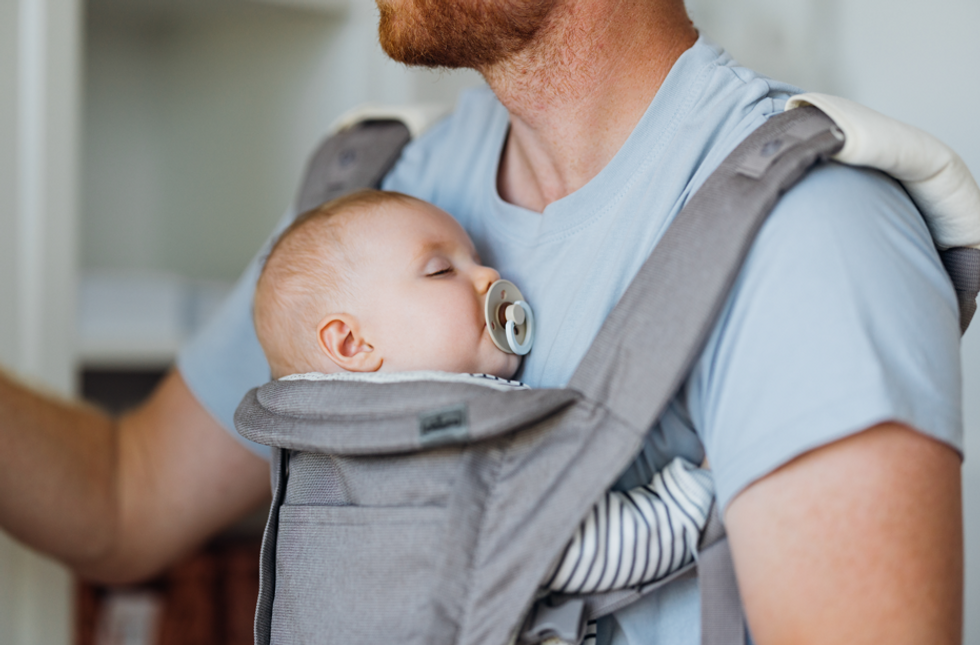
GB News has explored the reasons behind Britain's baby bust
| GETTYIt shows immigration has been responsible for 98 per cent of the increase, with two per cent, or just 29,982, attributed to the difference in birth/death rates.
There were an estimated 61.8 million people in England and Wales in mid-2024, up 706,881 from 61.1 million in mid-2023, according to the Office for National Statistics (ONS).
The figure, which equals a 1.2 per cent rise, comes after a rise of almost 3.6 million between the 2011 and 2021 Census.
However, the latest surge is the second-largest numerical jump since 1949, when comparable data became available, behind only the rise of 821,210 that occurred in the preceding 12 months from mid-2022 to mid-2023.
Mrs Cates compared the UK with Japan, which both suffer from low birth rates but have vastly different immigration figures.
The latest data from Tokyo showed that Japan’s fertility rate fell to a new low of 1.15 in 2024, down from 1.2 the previous year.
Meanwhile, across England and Wales, a correlation appears to have emerged between regions with higher immigrant populations and higher birth rates.
Dr Ben Brindle, Researcher at the Migration Observatory at the University of Oxford said: "The proportion of births to non-UK-born women has increased over recent years, but this is primarily because British women are having fewer children, not because migrant women are having more children.
"At the national level, migrant fertility rates are higher than Brits’ fertility rates.
"However, we can’t estimate the contribution of migrant women to births at the local level because figures on the migrant population by local authority are not currently reliable enough."
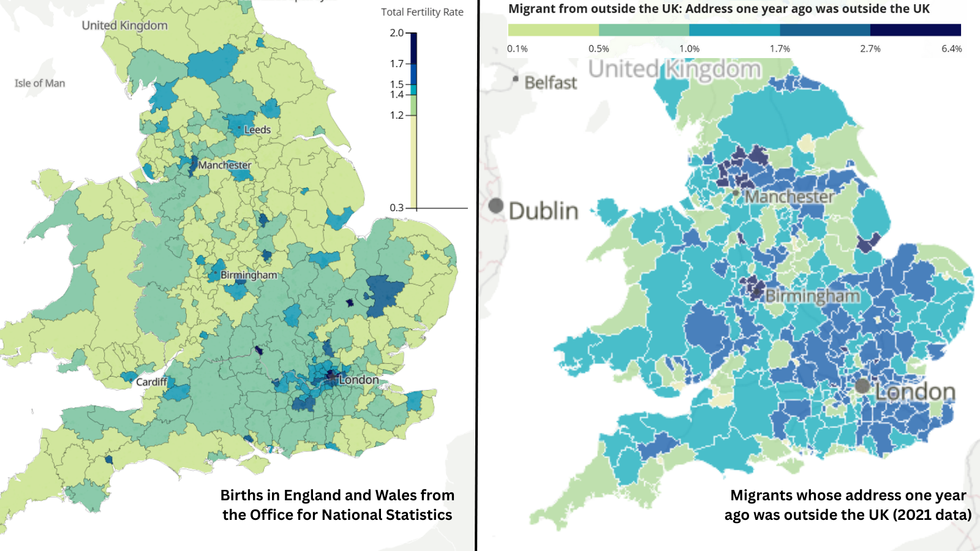
Across England and Wales, there appears to be a correlation between regions with higher immigrant populations and high birth rates
|ONS
The fertility rate for foreign-born mothers has increased in the past two years to 2.03 children per woman, according to ONS data, putting it close to the population-sustaining "replacement level" of at least 2.1 children per mother.
The foreign-born fertility rate is nearly a third - 31 per cent - higher than that of UK-born mothers, whose rate has fallen well below the level needed for population growth and puts it on track for long-term decline.
Mrs Cates added: "And even if immigration were the answer to low birth rates, it would be a short-term one.
"Almost every country in the world is experiencing falling fertility – by the end of this century, just five countries in the world will have above replacement birth rates.
"In a few decades' time, developing countries simply won’t have any spare young people to prop up the labour forces of Western economies.
"The picture is extremely bleak. Unless we reverse birth rate decline, we face a future either of even higher levels of migration, or perpetual shortages and inflation, or both."
Mr Davies added: "Importing a workforce from other countries will bring its own trade-offs and ethical dilemmas, but current productivity in the UK is simply not high enough to meet the economic shortfall that will come about through a shrinking workforce.
"While issues like the cost of childcare often get cited for declining birth rates, there is little correlation between cross-national birth rates and childcare costs."
Mrs Cates also described the idea that an increase in workforce productivity could counteract the low birth rates as "wishful thinking".
The former MP argued that the costs of raising children have been completely privatised, with parents bearing almost full financial responsibility for the costs of having and raising children, but the benefits of those children- a lifetime of tax contributions on labour-go entirely to other people.
She noted: "When once upon a time having children was a route to economic security, it is now a financial liability.
"It's frankly remarkable that so many people do still choose to have children when the economic incentives have become so perverse.
"We can either socialise the cost of having children, using taxpayer funding to assist parents with childcare costs, housing costs, and the loss of income that is experienced with having children, just as we assist pensioners with the cost of old age.
"Or we dismantle the welfare state, so that families look after each other and restore the personal financial incentive for having children.
"The first of these options is massively expensive but politically palatable. The second option is politically impossible but may be forced upon us by impending economic collapse."
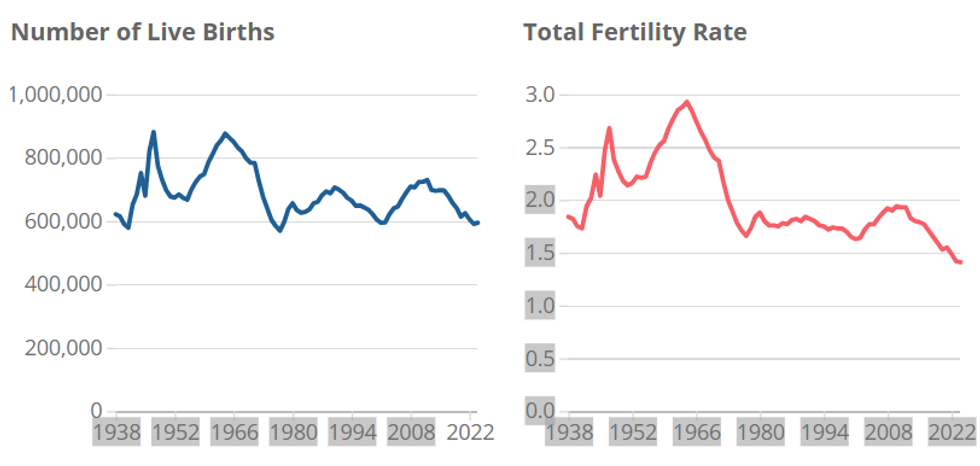 Births in England and Wales from the Office for National Statistics | Births in England and Wales from the Office for National Statistics
Births in England and Wales from the Office for National Statistics | Births in England and Wales from the Office for National StatisticsThe UK’s fertility rate has been below replacement since 1970, leading commentators to describe Britain's population as "ageing".
Detailing the economic impact of Britain's "ageing population", Mrs Cates also told GB News: "In 1970, there were 4.5 working age people to support each pensioner; in 2025 there are just three working age people for each pensioner and by 2060, there are likely to be just two to one (this is known as the ‘dependency ratio).
"While it might be sustainable to spread the costs of one person’s pensions, health and social care across 4.5 workers, it is completely unrealistic to expect just two workers to shoulder the burden.
"The average 80-year-old receives at least £20,000 in state spending every year.
"Very obviously this cannot be funded by the tax of two average workers - someone on median income currently pays around £4,500 in tax each year.
"It is a common misconception that retirees have ‘paid in’ to their state pension – in reality, all income tax and national insurance receipts are spent immediately by the Government – there is no ‘pot’ into which individuals’ contributions are saved.
"Today’s pensions are being paid by today’s taxpayers and, thanks to the amazing increase in life expectancy, the current generation of retirees is set to receive tens of thousands more in state benefits than they paid in during their working lives."
She also argued that unless Britain increases the birth rate and raises the ratio of young to old back to 1970s levels, the UK's welfare state will be bankrupt.
She added: "There will be worsening labour shortages and inflation, and, eventually, population collapse."
"A fertility rate of 1.41 means that each generation of Britons will be a third smaller than the one before.
"So, 100 British people alive today will have 67 children between them, 44 grandchildren and just 29 great-grandchildren.
"Our native population is set to decline by over 70 per cent in just three generations."
Meanwhile, Reform UK MP Sarah Pochin MP said: "Successive Labour and Conservative governments have made it increasingly difficult and expensive to have a family.
"Women are responding by having fewer children and giving birth later, fuelling a fundamental crisis in this country.
"Reform UK is the only party that recognises the crisis that families are in. By scrapping the two-child benefit cap for parents that are in work and introducing a 25 per cent transferable marriage tax allowance, a Reform Government would put more money in the pockets of working families."
Reform UK, led by Nigel Farage, has pledged to scrap the two-child benefit cap, a policy that limits means-tested benefits for families with more than two children.
The party argues that this will make life more affordable for lower-paid families and potentially encourage a higher birth rate, positioning a pro-family stance and combating the low fertility rate crisis.
Meanwhile, Labour has not scrapped the cap despite Sir Keir Starmer facing increasing pressure from backbenchers.
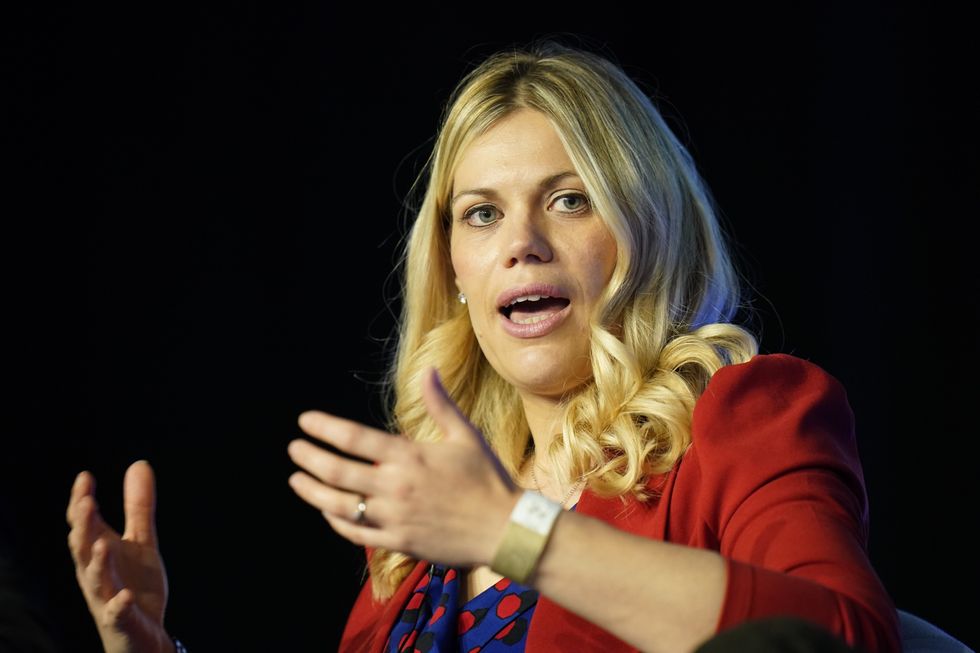
Miriam Cates is a former Conservative MP and advocate for increasing Britain's birth rates
|PA
Despite claiming he would remove the policy whilst in opposition, the Prime Minister has since warned of the significant cost involved, as Rachel Reeves scrambles to find additional funding for her autumn budget.
The Institute for Fiscal Studies (IFS) suggests scrapping the policy could cost the British Taxpayer billions per year.
Mrs Cates claims the welfare state has removed the link between having children and future economic security by socialising the cost of old age.
She added: "Everybody gets a state pension, healthcare, social care and help with housing costs regardless of how much has been paid into the system and whether or not an individual has had their own children and has therefore contributed to the future of the nation.
"But transferring the duty of caring for the old from families to the state, we have removed a vital purpose for having children."
The former Tory MP highlighted that countries like Hungary, Poland and France have all spent considerable amounts of money encouraging people to have children, pointing out that the Government could do more to address the crisis.
She added: "It is true that none of these countries have returned their birth rates to replacement levels. But that doesn't mean that family friendly policies haven't had an impact."
Hungary had the lowest total fertility rate in all of Europe, at just 1.2 children per woman in 2010, but has since introduced tax breaks, improved maternity pay, and loans for houses and cars, all designed to encourage young couples to have children.
Hungary's fertility since rate has increased to 1.4 following the policy changes.
Over the next decade, the rate rose steadily to above 1.6 in 2021, with a top adviser to the prime minister, Balázs Orbán, previously stating: “Hungary now has the third-highest fertility in the EU. … In 2010, we had the lowest.”
France devotes a significant portion of its GDP to family policy, with approximately four per cent allocated to parental leave, family allowances, early childhood care, and other family support measures.
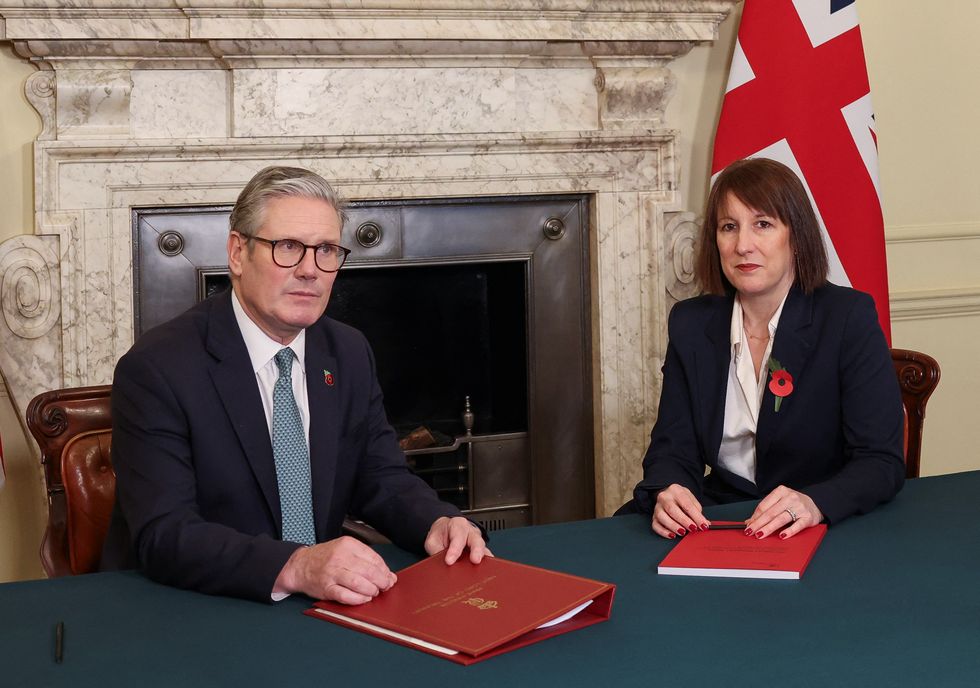
Keir Starmer has warned of the significant cost involved in scrapping the two-child benefit cap as Rachel Reeves prepares for the autumn budget
| PAThis has been credited for France still having one of the highest fertility rates in Europe with 1.62 - but has suffered a slight decrease in recent years.
President Emmanuel Macron addressed this dip in January 2023 when he called for a "demographic rearmament" with new reforms making it easier for people to have children, including increasing the financial aid both parents receive while they look after their newborn babies, for up to six months.
Experts estimate that French family policies have resulted in an additional five to 10 million French births, a not insignificant contribution to French society and economy.
Comparing the UK's policies to those of other European nations, Mrs Cates said: " Britain has perhaps one of the worst economic climates in the West when it comes to having children.
"Unlike almost all compatible nations, there are no tax benefits for getting married or having children. In fact, Britain has a 'couple penalty', where many parents are financially better off if they separate.
"Unlike in most European countries, there are no tax breaks associated with having children, even though parents are doing the vital and nationally essential work of raising the next generation.
"British families pay around 30 per cent tax more than the OECD average, and our housing prices are among the highest in the world.
"The Government could improve this economic climate by restoring the kinds of tax breaks that were commonplace here in the UK until the 1990s, and subsidising the cost of housing for young people."
Reform UK MP Richard Tice said: "We need economic policies that support British families, encourage higher birth rates, and ensure that the interests of the British public come first."
Mr Davies opposed the idea of "spending countless billions on subsidising births", saying the counties involved have only seen "a marginal effect."
A 2025 YouGov report found that 28 per cent of young Britons aged between 18-40 do not want children.
The standardised mean age, which represents the average age of mothers and fathers, taking into account the age distribution for women and men of reproductive age in the general population, has increased for mothers from 30.9 years in 2023 to 31.0 years in 2024.
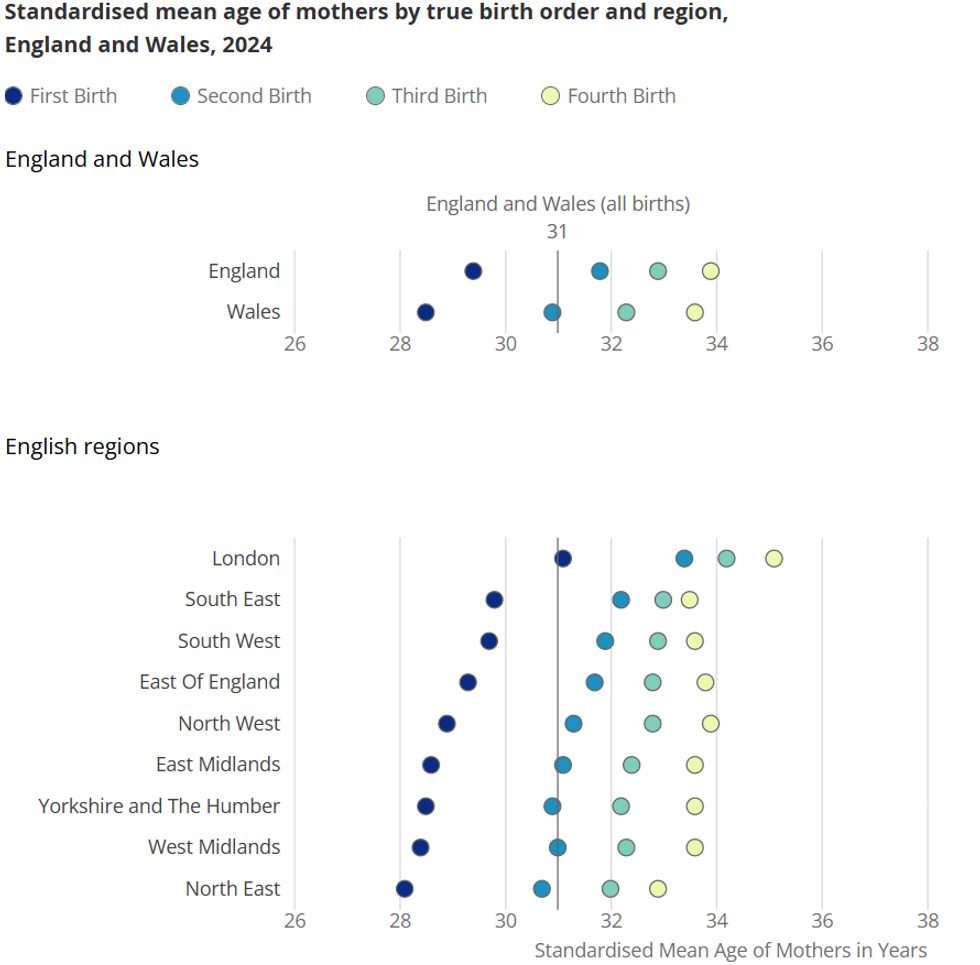
Standardised mean age of mothers by true birth order and region, England and Wales, 2024
|ONS
The British Fathers' standardised mean age saw a similar increase, from 33.8 in 2023 to 33.9 in 2024, representing a shift among Britons to want children at an older age.
In addition, fertility rates decreased for mothers in the 25-29 and under age groups, increased for those in the 30 -39 age group, and remained unchanged for those in the 40 and over age group in 2024.
Mrs Cates pointed to polling that includes factors of not meeting the right partner, not feeling ‘ready’, the high cost of living and housing prices as reasons couples will wait longer to have children.
She explained: "Married couples still have two or three children on average, but fewer and fewer people get married, and at a later and later age, pushing up the number of people who never become parents.
"But underlying collapsing birthrates across the West is a much more profound societal change that must be reversed if we are to have any hope of improving our birth rate.
"In the past, becoming a parent was not just socially or emotionally fulfilling but economically necessarily.
"If you didn't have children, then who would care for you in sickness and old age? Who would work in your family business? It's easy to romanticise the reasons for having children, but before the welfare state there were obvious economic benefits to becoming a parent.
"I am convinced that until children become necessary again- as they were naturally meant to be-we cannot hope to avoid the disaster of Britain’s baby bust."
Mr Davies added: "The consistent major factor across most countries appears to be marriage rates.
"People tend not to have children until they are in a stable relationship and with marriage rates collapsing in the UK, birth rates are following suit."
More From GB News


